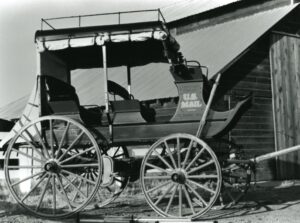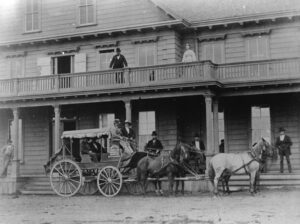
Many docents here at the Kelley House Museum love stagecoaches. Whether traveling in them or robbing them, this form of early transportation produced many adventurous stories that were published in the Mendocino Beacon.
Stages arrived via the primitive roads to Mendocino from the southeast and north, serving towns that often no longer exist. They ran daily and weekly, depending on destinations, carrying passengers inside the coach and two more on top with the driver.
Drivers were respected for their ability to handle four ribbons (reins) laced between their fingers and their expertise with a long whip. They were thoughtful men, full of jokes and news from the outside world and focused on the care of their customers.
In 1867, Len Barnard, who had started driving stages at the age of 11, had a stage line running north through Kibesillah to Westport and by 1870 from Westport you could go east to Cummings, south to Cahto and on to Willits. Rides often took several days. From Cloverdale, stages came through Oak Valley, Mountain House, Yorkville, Anderson Valley, Navarro Ridge, Albion and then north on the Coast Road to Mendocino.

In 1870, a person would spend $3 and three days travel on a stage that left Ukiah, go through Low Gap, stop one night at the Halfway House and another in Comptche and then on to Mendocino. By 1890, stages went south to Point Arena and on through Sonoma County. From Fort Bragg going north to Moody and east to Garberville, travelers could get to Eureka, Oregon.
Robbers of stagecoaches made great newspaper stories. Sometimes they got thousands of dollars and sometimes nothing. An 1898 stage from Cloverdale was held up and the robbers told the driver to throw down “the express box.” There was just $34 in coin in it. But another lone highwayman’s raid on a “down coast” stage (doesn’t say WHERE on the south/down coast) scored $600 from the money box.
Sometimes guards sent with drivers to protect money shipments got shot dead by bandits. In 1897, 7 miles from Ukiah on the Booneville Road, the guard died protecting $2,000 in coin headed for a lumber mill for payroll. A posse with a bloodhound couldn’t find the bandits.
Mendocino County Sheriff J. M. Standley had a stellar reputation for catching bad guys. Over a period of five years, he pursued and caught 14 perpetrators of robberies and saw them convicted.
In 1877, travel tips for stagecoach passengers included doing what the driver told you, as well as getting out and walking when horses faced difficult terrain. Don’t grumble about food served at stage stops. Don’t flop against those seated next to you when you fall asleep. Don’t shoot from the coach as is may frighten the horses. If ladies are present, do not point out locations where robberies and murders have been committed. Don’t discuss religion or politics.
The most famous Mendocino County stage driver was not a man but a lady worthy of admiration, Delia Haskett (1861-1949). From 1875, when she was age 14, to 1888 she filled in when needed for her dad, who owned a stage line in Ukiah. She had grown up riding along with her father and would drive by moonlight from Ukiah to Willits or Lakeport alone. No robbers ever threatened her, though she later said she thought she passed the infamous Black Bart more than once. She raced horses, did trick riding, won shooting matches and was an expert with a whip.
After filling in for absent stage drivers, singing for her customers, and having a life of adventures in the redwoods, she moved south and in later years was a mine owner, oil baroness, rancher, horticulturist, inventor, and mother of a movie star. When the California Pioneer Stagecoach Drivers Association formed in 1934, she was the only woman accepted in the group. Delia Haskett was a shining example of the strong women Mendocino County produced.
For more stagecoach adventures, a curious reader could come by and search the archives of the Kelley House Museum. Our address is 45007 Albion Street in Mendocino. Contact us at info@kelleyhousemuseum.org or call 707/937-5791.
Note: The Research Office has recently revised its hours to match those of the Museum: Friday, Saturday, Sunday, and Monday from 11:00 to 3:00. We appreciate those who call ahead and book an appointment!